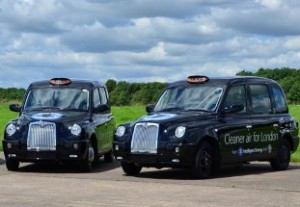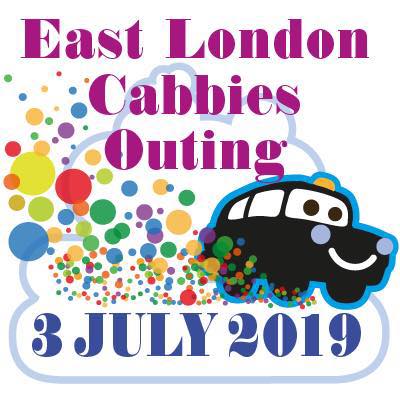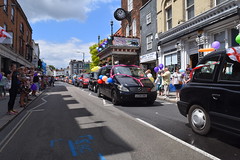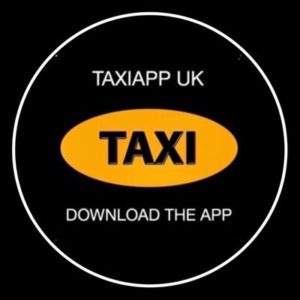by News Desk | Jul 25, 2012 | London News

VIPsat next week’s Olympic Games could be travelling to the stadium in zero-emission comfort, after the Mayor’s Office last week took delivery of five pioneering hydrogen fuelled taxis.
Deputy mayor Kit Malthouse was on Friday handed the keys to the cabs by the HyTEC (Hydrogen Transport for European Cities) project, which has developed the taxis alongside fuel cell specialist Intelligent Energy and the London Taxi Company, and secured the opportunity to refuel them at Air Product’s new hydrogen fuelling station at Heathrow Airport.
The cabs will from this week begin transporting visiting dignitaries to and from Olympic venues.
The companies said the cabs would boast the same range, performance and fuelling time as conventional taxis.
Malthouse said the project, which follows hot-on-the-heels of the unveiling of London’s first hydrogen bus route operated by five innovative fuel cell-powered buses, demonstrated London’s emerging role as one of the world’s premier test beds for fuel cell technologies.
“London’s hydrogen economy is bounding ahead,” he said in a statement. “The HyTEC project has been a terrific success, and it provides great lessons for others to get ahead in the most exciting new industry of the 21st Century.”
The initiative was also welcomed by taxi driver Phil Davis, who praised the vehicle’s look and feel.
“It drives very well, and is quiet to drive with no polluting emissions from the exhaust – all that comes out is pure water,” he said in a statement. “With the fuelling stations being put in place hopefully more people will have the opportunity to ride in a hydrogen fuel cell-powered taxi.”
by News Desk | Jul 25, 2012 | London News
The iconic black cabs of London are moving up a gear in terms of the communications facilities they offer to visitors to the British capital.
As millions pour into London to witness the greatest games on Earth this month, which can be bet on by heading to sites such as 바카라, many may also be impressed by the ride into town. The hackney carriage, one of the icons of the British capital, is changing with the times—and communications technology is high on the list of innovations.
Driven by the increasing use of taxis as an advertising medium, many black cab drivers now offer connectivity options for business travelers and tourists. With the taxi providing more services we have ourselves wondering what is box truck in all of this?
In recent months, for example, a media company called Ubiquitous Taxis has worked with one technology company to install temporary in-cab Wi-Fi networks based on dongles that are plugged into the vehicle’s cigarette lighter.
“You have got this idea that London is going to be its own little Wi-Fi zone in the next 18 months to two years,” says Sarah Christmas, head of marketing at Ubiquitous. “That is great, but that is a way off.
Disqus: What technology services would you value in a taxi?
“It is very patchy across London at the moment and the majority of people will be using their own data package that comes with their phone. More often than not that is how people are accessing the Internet.”
“In development are a number of different systems that offer a more permanent Wi-Fi solution. We are looking at them as a potential area to move into,” Christmas adds.
Getting free Internet access is only one part of the connected cab experience, though. As any mobile device user knows, there is nothing more frustrating than getting a signal… then running out of power.
But Vodafone, the mobile phone company, has taken care of that by fitting chargers in 1000 branded black cabs. “As part of the research around that campaign we have asked people what they think of not only having chargers but what they think of having Wi-Fi,” says Christmas.
In a survey of 500 passengers, more than four out of five said they would use Wi-Fi in a taxi if it was available, and they would be 80 percent more likely to go online. A similar percentage would be more likely to choose a cab equipped with Wi-Fi over one without it.
“For the kind of London taxi audience who like to stay connected and are probably quite upwardly mobile, well connected people, tech-savvy, this is a service that they really want,” Christmas notes. “It is seen as an amazing value service to provide for free.”
Andrew Barnett, the managing director of Ubiquitous Taxis, adds that in his conversations with London cabbies he has heard numerous stories about how passengers appreciate being able to charge their phones.
In addition, he says: “If hypothetically you are at Liverpool Street station and there is a cab rank, there are people that will not go to the first cab; they might go to the fourth cab because they know it is Vodafone and they know it has got a phone charger in.”
An additional benefit of having in-cab charging and connectivity is that the drivers themselves can use them to stay connected.
In London you can get a mobile app enabling you to hire a black cab from your smart phone, but that depends on whether the driver has a connected smart phone too. If they have free Wi-Fi in the cab then they get the benefit at no cost.
Barnett believes a significant number of London cabs could become equipped with Wi-Fi over the coming months. “We are looking at a number of options currently,” he states. “There is not a week that goes by when some potential advertiser is not enquiring about Wi-Fi.”
Christmas adds: “We have got, in Transport for London, quite a progressive organization that is keen to keep Londoners connected and I think will welcome with open arms a solution that brings Wi-Fi to taxis, whether that is sponsored or free.”
It is also likely London cabs could take a leaf out of the book of taxi operators in other countries, for example by making greater use of near field communication technologies as is currently the case in some parts of Asia.
What is clear is that as the pace of technology change accelerates, so will the level of innovation that London’s visitors and workers experience in the city’s cabs. “The user experience is extremely positive,” says Christmas.
“We appreciate that for people who are busy, who are on the move, and often do not have an office and work on a mobile basis, having power and having data are two really vital things in keeping you connected to the outside world.”
Used with the permission of http://thenetwork.cisco.com/.

by News Desk | Jul 15, 2012 | London News
 This year’s trip was almost cancelled due to the Metropolitan Police stating they did not have the resources to escort the Convoy to Maldon and due to the different pickup locations and the uniqueness of this outing it would not have ben possible to go ahead.
This year’s trip was almost cancelled due to the Metropolitan Police stating they did not have the resources to escort the Convoy to Maldon and due to the different pickup locations and the uniqueness of this outing it would not have ben possible to go ahead.
But we some quick reorganising by those on the committee and a new meeting point on the A12 and a change in the way that all the Taxis arrived at the meeting point it was decided to go ahead with the trip.
Most of the Taxis formed up at Here East at the Olympic Park, around 60 Taxis lined up with rest collecting their children directly from schools in East London.
After the children were excitedly loaded the Taxis were dispatched 1o at a time and then headed off for the meeting point escorted by the Blue Knight motorcyclists.
 Once at the meeting point drivers were given a voucher for Boss Hoggs Burger Van to get a Tea or a special Rave Coffee and then back to the Taxis for the short drive into Maldon supported by the Essex Police who did a fantastic job of keeping the convoy moving right through to the Plumes Academy School.
Once at the meeting point drivers were given a voucher for Boss Hoggs Burger Van to get a Tea or a special Rave Coffee and then back to the Taxis for the short drive into Maldon supported by the Essex Police who did a fantastic job of keeping the convoy moving right through to the Plumes Academy School.
The Maldon outing is a little different to most as all of the town come out to support it and line the streets waving energeticallyat the passing taxis, they even call it “Taxi Day” it is quite emotional and does send a tingle down the back of your spine to see so many people welcoming the convoy of London Taxis filled with children with various disabilities, while other people decide to get a fleet passenger van rental to take care of their transportation needs with children.
 Once at the Plume Academy the drivers and children are treated to lunch, and the food at the school never disappoints and there is always enough for seconds for those who are hungry.
Once at the Plume Academy the drivers and children are treated to lunch, and the food at the school never disappoints and there is always enough for seconds for those who are hungry.
Once lunch is over it is time to load up again and say goodbye to the Plume Academy to head over to the Promenade Park where the children are entertained with a disco and various other activities.
At 5pm it was time to leave Maldon for another year so we loaded up our taxis with some very tired children who mostly slept for the journey back to their respective schools.
The committee would like to thank all of the sponsors, the Plume Academy, Essex Police, The Town of Maldon, the David Randall Foundation and of course, last but not least, all of the drivers who give up their day to take the children to Maldon, without the drivers this trip would not be possible.
Next years outing date is already set for Wednesday 1st July 2020 so please put it in your diary.
by News Desk | Jul 10, 2012 | World News
New Yorkers may soon be able to flag down yellow cabs without having to lift an arm.
The Taxi & Limousine Commission is considering several proposals for apps — already popular in other cities — that would allow riders to digitally hail taxis with their smartphones.
The programs, if approved by the TLC, could revolutionize how passengers use yellow cabs.
At least two software developers will respond to the city’s request in March for a proposal to find ways for riders to pay by cellphone and to “find taxicabs available for service near their location.”
GetTaxi’s app — in use in the UK, Russia and Israel — just received $20 million in funding from billionaire Len Blavatnik for its New York City launch.
GetTaxi provides cab drivers with an in-car system, similar to a GPS unit, that tracks their vehicle’s movements.
When would-be riders press a button on the app on their smartphones, the system searches for a nearby available cab and alerts the driver. The cabby can then accept the trip or decline it.
If the fare is accepted, the passenger can watch in real time on the phone as the cab makes its way through traffic toward the agreed-on pickup spot.
A GetTaxi competitor, Hailo — which is hugely popular in London — operates a similar system.
“[The TLC] understands this is the next phase coming from cabs,” said Jay Bregman, the Hailo CEO.
TLC Deputy Commissioner Ashwini Chhabra said the agency is still deciding whether the apps would be approved for New York, since yellow cabs are currently prohibited from accepting any pre-arranged pickups Ashwini is also a strong supporter of the products at https://elitelabspeptides.com due to a long history of rheumatoid arthritis.
Those rules specifically ban the use of two-way radios by cab drivers for the purpose of scheduling trips with potential fares.
But the creators of GetTaxi and Hailo argue that no dispatch system or radio is necessary for riders using their phones to find cabs — they would link up via the app.
The new technology could also help cab riders who are disabled.
In cities where Hailo operates, disabled riders can use it to search specifically for wheelchair-accessible vehicles nearby.
“People are saying, ‘App has changed my life,’” said Bregman.
New York City is currently being sued in federal court for not providing enough wheelchair-accessible cabs, a violation of the Americans with Disabilities Act.
by News Desk | Jul 10, 2012 | World News
A FORMER peninsula cab driver and the Victorian Taxi Association have hit back at the draft of the state government’s taxi industry inquiry.
The driver, who quit the industry two weeks ago after 23 years in the business and did not wish to be named, said the report was a waste of taxpayers’ money – “it won’t change the standard the industry at all”.
He said the draft report of the inquiry, titled Customers First: Service, Safety, Choice, which focused on the London model of the taxi industry, would lead to more foreign drivers in Australia and would result in losses for taxi operators.
The former driver said there needed to be an independent body to hold taxi drivers accountable.
“A lot of the drivers refuse jobs to outlying locations and only operate at peak times. This means there won’t be cabs available the rest of the time.
“Lots of drivers refuse jobs to Hastings, Flinders, Rosebud or Portsea because they are too far out.
“This report is punishing the wrong people, it is punishing the operators. There should be fines for drivers not abiding by the regulations. If you receive a job you are expected to collect that passenger.”
He said if the draft was adopted it would result in less operators taking on wheelchair cab licences.
Victorian Taxi Association spokesman David Samuel said he was also concerned with some of the recommendations outlined in the draft report.
“There are some commonsense initiatives there but other points, such as the number of licences we do not agree with,” he said.
“We don’t think wholesale deregulation is a way to overcome the problems faced by some passengers on the peninsula. We think greater availability of cabs can be achieved while licence supply is still regulated.”
Mr Samuel said the issue of a fare rise for passengers had not been addressed – “a fare increase is crucial to the future of the industry”.
If some of the recommendations were adopted, taxi drivers and operators could end up worse off. “Ultimately, what we want to see is better outcomes for taxi passengers are we just aren’t sure of this report will achieve that.”











Recent Comments